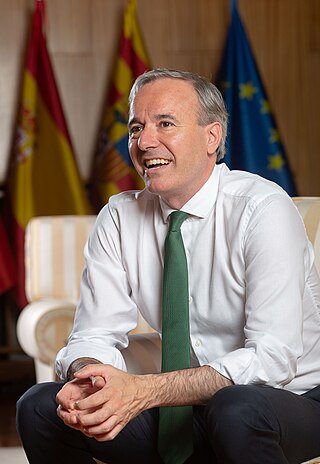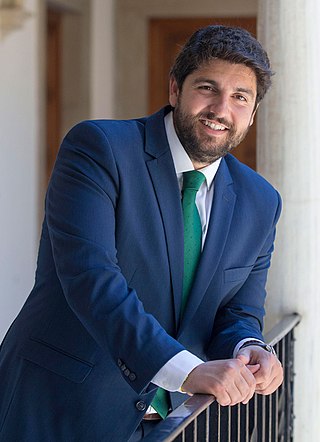
The president of the Community of Madrid is the highest-ranking officer of the Autonomous Community of Madrid and the head of the executive branch. The office is currently held by Isabel Díaz Ayuso of the People's Party.

The president of the Valencian Government is the head of the Generalitat Valenciana, the government of the Spanish autonomous community of Valencia. The president is chosen by the Valencian parliament, the Corts Valencianes.

The President of the Junta of Communities of Castilla–La Mancha, usually known in English as the President of Castilla–La Mancha, is the head of government of Castilla–La Mancha. The president leads the executive branch of the regional government.

The Ministry of Health (MISAN) is the department of the Government of Spain responsible for proposing and executing the government policy on health, planning and providing healthcare as well as the exercise of the powers of the General State Administration to assure citizens the right to health protection. The Ministry is headquartered in the Paseo del Prado in Madrid, opposite the Prado Museum.

The Ministry of Territorial Policy and Democratic Memory (MPTMD), is the department of the Government of Spain which manages the policies of the government regarding relations and cooperation with the Autonomous Communities and with the entities that integrate the Local Administration and those related to the territorial organization of the country and with the Government Delegations and Sub-Delegations in the regions and provinces.

The president of the Balearic Islands is the head of government of the Balearic Islands, one of the 17 autonomous communities of Spain, while the monarch Felipe VI remains the head of state as King of Spain.

The president of the Government of Aragon, also known as the president of the General Deputation of Aragon or, simply, the president of Aragon, is the head of government of Aragon, an autonomous community in Spain. The President is elected to a four-year term by the Aragonese Corts.

The president of La Rioja is the head of government of the Spanish autonomous community of La Rioja. The current incumbent is Gonzalo Capellán of the PP, who has held the office since 29 June 2023.

The president of the Regional Government of Andalusia or, simply the president of Andalusia, is the premier of the devolved government of the Spanish autonomous community of Andalusia. The presidency is one of the three branches of the Regional Government of Andalusia (Junta de Andalucía), the institution whereby the government of the community is organized. The other two branches of are the Parliament of Andalusia and the Council of Government.

The president of the Junta of Castile and León is the executive head of government of the Spanish autonomous community of Castile and León. The president is the head of the Junta of Castile and León, or regional government.

The President of the Region of Murcia, is the head of government of the Spanish autonomous community of the Region of Murcia. Since 2014, no person who has been elected to two terms may be elected to a third.

The Mayor-President of the Autonomous City of Melilla or simply the President of Melilla, is the highest authority of the Spanish autonomous city of Melilla, acting as head of government and as presiding officer of the Assembly of Melilla.

The third deputy prime minister of Spain, officially the Third Vice President of the Government of Spain, is a senior member of the Government of Spain. The office is not a permanent position, existing only at the discretion of the prime minister (PM). It is a constitutional office because the Constitution provides for the possibility of more than one deputy PM.
The president of the Government of Navarre, is the head of government of the devolved government of the Chartered Community of Navarre.

The first government of José Luis Rodríguez Zapatero was formed on 18 April 2004, following the latter's election as Prime Minister of Spain by the Congress of Deputies on 16 April and his swearing-in on 17 April, as a result of the Spanish Socialist Workers' Party (PSOE) emerging as the largest parliamentary force at the 2004 Spanish general election. It succeeded the second Aznar government and was the Government of Spain from 18 April 2004 to 14 April 2008, a total of 1,457 days, or 3 years, 11 months and 27 days.

The second government of José Luis Rodríguez Zapatero was formed on 14 April 2008, following the latter's election as Prime Minister of Spain by the Congress of Deputies on 11 April and his swearing-in on 12 April, as a result of the Spanish Socialist Workers' Party (PSOE) emerging as the largest parliamentary force at the 2008 Spanish general election. It succeeded the first Zapatero government and was the Government of Spain from 14 April 2008 to 22 December 2011, a total of 1,347 days, or 3 years, 8 months and 8 days.

The second government of José María Aznar was formed on 28 April 2000, following the latter's election as Prime Minister of Spain by the Congress of Deputies on 26 April and his swearing-in on 27 April, as a result of the People's Party (PP) emerging as the largest parliamentary force at the 2000 Spanish general election. It succeeded the first Aznar government and was the Government of Spain from 28 April 2000 to 18 April 2004, a total of 1,451 days, or 3 years, 11 months and 21 days.

The second government of Pedro Sánchez was formed on 13 January 2020, following the latter's election as Prime Minister of Spain by the Congress of Deputies on 7 January and his swearing-in on 8 January, as a result of the Spanish Socialist Workers' Party (PSOE) emerging as the largest parliamentary force at the November 2019 general election. It succeeded the first Sánchez government and was the Government of Spain from 13 January 2020 to 21 November 2023, a total of 1,408 days, or 3 years, 10 months and 8 days.



































